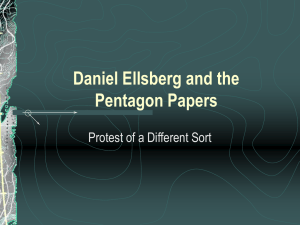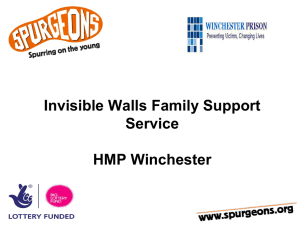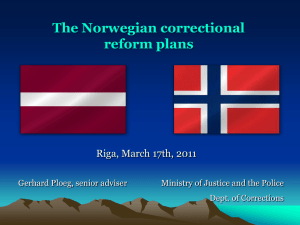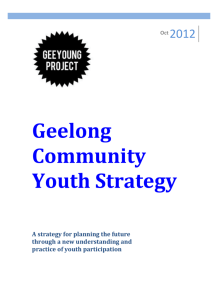vacro - The Reintegration Puzzle
advertisement
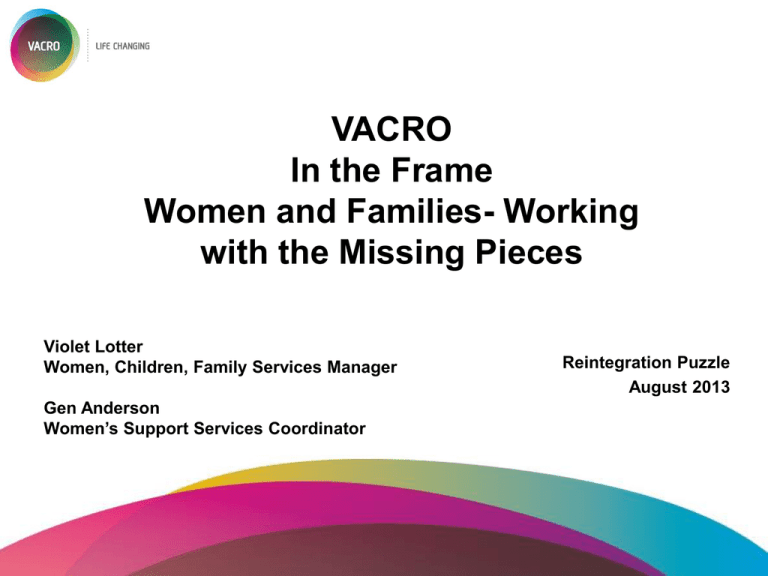
VACRO In the Frame Women and Families- Working with the Missing Pieces Violet Lotter Women, Children, Family Services Manager Gen Anderson Women’s Support Services Coordinator Reintegration Puzzle August 2013 The VACRO Story • Established in 1872 as the Discharged Prisoners’ Aid Society, the Victorian Association for the Care and Resettlement of Offenders (VACRO) is a non-denominational, community-based agency. • First Victorian organisation to recognise and include offenders families as part of its primary mission • VACRO works across the criminal justice system to create a safe and fair community, to respect and support individual and family dignity, and to make a positive contribution to reducing the harm done by crime. Justice Programs [Men & Women] Family Programs Research & Development • 2012 VACRO launched their Children’s Foundation Our aim today….. To give you an overview of our work with families and children [hidden victims] and women in the criminal justice system and relate this to the VACRO research that influences our approach. VACRO’s Family Services Supporting individuals and their families… at the time of arrest, through court, in the prison system and out in the community. Research & Services • First hand experience of the impact of incarceration on families and children • Awareness of these needs has grown & led VACRO to Initiate family focused research Expand service provision to include information, support and counselling for these families and children Research & Resources: Doing it Hard (2000) “Imprisonment has a profound effect on children and there is considerable consistency between the findings of the few studies which have examined these effects.” Research & Resources: Children: Unintended Victims of Legal Process 2006 & 2007 This project tracked the needs of children with imprisoned parents from the stage of police contact to the point of prison release Research & Resources: Court Based Family Support (2009) An estimated 67,631 children aged 017 years are associated with adult defendants processed in the Magistrates’ Court of Victoria. An estimated 2,689 children aged 0-17 years are associated with adult defendants who received a sentence of imprisonment in the Magistrates’ Court of Victoria. In 2012 VACRO commenced our Family Links Program in Geelong Magistrates Court Research & Resources: Next Generation on the Outside (2011) • Report looks at the ordinary functioning of the criminal justice system and the unintended adverse effects on families and children of offenders. Each Step Equally Impacts Upon the Family VACRO Women, Family and Children’s [WF&C] team offer services that provide information, support and counselling at each step: Arrest Court Bail/Remand Prison Orders Community Parole Reintegration Issues for Prisoner’s Families Issues are complex depending on relationship to prisoner, nature of crime, length of sentence Issues include: Sadness and Grief Shame, guilt and anger Stigma Social isolation, rejection What, when and how to tell the children Financial concerns, loss of income Relief Barriers to Accessing Supports Families are unlikely to come forward due to fears of being judged, and embarrassment of ‘needing help’…often for the first time. “I found it really hard to tell anyone; even my maternal child health worker and child care centre didn’t know my husband was incarcerated. I was so worried that they would judge me and my children. It would have made it easier if they understood what I was going through” (Partner) Children and young people can feel this even more acutely with the pressures of relating to peers and wanting to fit in. What about the Children? • • • • Imprisonment has a profound effect on children The stress associated with social stigma and isolation Keeping secrets Uncertainty and disruption about the absence then reappearance of a parent • Separation anxiety – Worry that they have been abandoned or will never see the parent again – Worry that the remaining parent will disappear • Difficulties at school What Do We Know About These Children? • Approximately 5% of all Australian children and 20% of Indigenous Australian children have experienced parental incarceration. (Children, un-intended victims of legal process) • Approximately 38,000 children have a parent in prison [Quilty 2005] • “ Incarceration of a parent significantly increases the likelihood of future incarceration of a child” (FaCS 2003:5) Grief – major impact Name the grief : loss of what was and what was expected to be Disenfranchised grief My daughter was in such as awful state, self-harming. She was struggling with the usual psychologist…but was so happy to get a worker who understood the system. Compound grief We realised that there were a lot of problems at school, he was really struggling and getting picked on a lot. I could see that he’s not just being a brat: there’s other issues involved. Complicated grief So how does VACRO work with the forgotten /unintended victims? Emotional Cycle for Women, Men, and Families in CJS VACRO Information & Referral Worker SKY Counselling & Community Consultation Arrest Family Information & Referral Worker Melbourne Assessment Prison Aboriginal Family Visits Program Post release celebration Child Care & Transport Subsidies Program Video Visits Program Pre-trial FamilyPeriod Links Geelong Magistrates Court Family Support Worker - Marngoneet Prison Incarceration Reality VACRO Women’s Mentoring Program Pre release Sentencing Link Out Emotional Cycle for Women, Men, and Families in CJS VACRO Information & Referral Worker SKY Counselling & Community Consultation Family Information & Information Referral Worker VACRO & Referral Worker MelbourneSKY Assessment Prison Counselling & Community Consultation Child Care & Transport Child Care & Arrest Family Information & Subsidies Program Transport Subsidies Aboriginal Family Visits Referral Worker Family Links Program Melbourne Aboriginal Family Visits Geelong Assessment Prison Program Video Visits Program Magistrates Court Pre-trial FamilyPeriod Links Geelong Magistrates Court Post release celebration Program Video Visits Program Family Support Worker: Family Support Worker Marngoneet - Marngoneet Prison Incarceration Reality VACRO Women’s Mentoring Program Pre release Sentencing Link Out VACRO Women’s Mentoring Program Men’s Transitional Services Support for Children (& their families) The SKY (Supporting Kids & Youth) Counsellor - Social work / family therapy - Lets the client define “family” (cultural awareness) - Throughput - Early intervention (from time of arrest, prioritising the younger children) - State-wide, outpost model. - Flexible number of sessions SKY Counselling • Child-centred family therapy • Lets the client define “family” (cultural awareness) • Early intervention (from time of arrest, prioritising the younger children) Examples of SKY Clients • Multiple traumas • Partners, parents, siblings of adult offenders… fearful of the impact the situation may have on their children’s future • Divided loyalties between carer and mum. • Reforming relationships and rebuilding trust (post release) Techniques & Therapeutic Frameworks • Single session or Ongoing • Family systems frameworks (structural, narrative, contextual) • Grief & loss • Trauma frameworks • Creative arts • Relaxation techniques • Play Examples of SKY Clients The Closet in my Head Client is 13 year old girl residing in foster care after both parents were incarcerated. SKY Community Consultation Provides training sessions for community, schools. • Knowledge of the adult criminal justice system • Understanding the impact of the system on children and families • Strategies • Awareness of the resources available. SKY Community Consultation Community Consultation Family-inclusive Practice VACRO Children’s Officer • Develops & maintains VACRO’s Children’s Policies & Procedures • Consultation for all teams, including our Men’s services • Training for all staff on working from a Family Inclusive persepctive Victorian Charter of Human Rights & Responsibilities Act, 2006 Shared Clients within VACRO Inclusive working with external agencies ie Odyssey Mirror Families, DHS, schools Why VACRO Works with Women • Gender matters significantly in shaping patterns of offending as well as the criminal justice system’s response to criminal offending • Gender is also important in examining the differential effects of current policies and practices. • The need to take into account the reality of women’s lives, characteristics, responsibilities, and roles in crime. What works for women from Women’s case Management Guide March 2010 A study of women after prison found that effective services were characterised by: • A holistic approach • Accessibility • Non-judgemental • Workers being reliable • Having a sense of humour • Believing the woman can change • A focus on the woman’s strengths VACRO Women’s Mentoring Program (VWMP) • Eleven year history, currently funded until June 2014. • Assists women to integrate into the community through the provision of support by voluntary female mentors from the community. • The program supports women exiting the prison system AND those on community corrections orders. Social Isolation Mentoring and Social Capital • Human capital Thinking style, motivation to change • Social capital The web of social relations within which we all liverelationships with family, informal social networks, relationships established through work, etc. • Human capital + Social capital = Desistance from crime VWMP: Desistance model 1. Human Capital • • • • Spending time reflecting on imprisonment, future plans, goals Positive reinforcement of non-offending routines and thoughts Challenging anti-social thoughts & patterns Assistance with justice system eg. court support • Ability to evaluate offending & prison • Interest in non-offending lifestyle and commitment to putting routines and behaviours in place for support • Improved self esteem and self-worth VWMP: Desistance model 2. Social disadvantage • • • • Advocacy with Centrelink and other agencies Assistance with budgeting Link to training and employment opportunities Identification of housing crises & referral to housing services • Stronger capacity to advocate with services • Increased likelihood of issues being identified & addressed by services • Increased resources to access employment/study VWMP: Desistance model 3. Social Capital • Egalitarian, trustworthy consistent, authentic friendship and support • Encouraging links with resources such as family and services • Assisting with links to work/study/volunteering • Capacity for better relationships with support services, families and other networks • Sense of support & connection, reduced isolation • Increased opportunities for work/study/volunteering • Sense of community ‘safety net’ Social Isolation The Volunteer Mentor and the participant spend time: -going for walks -shopping together to get used to large crowds -attending classes together to make new friends -helping develop goals This helps to break the cycle of isolation and increase the participant’s: self esteem & confidence... and leads to more productive participation in the community. Eligibility- Who is VACRO Women’s Mentoring Program for? • Participation is voluntary, not mandated. • Women exiting prison (up to three months prior) or on community correctional orders. • Mothers, daughters, sisters, neighbours, partners. • “Low” to “moderate” risk of re-offending. • Gender-specific (women only). • Average age of current program participants is 39. • Indigenous women, women from CALD backgrounds. • Women with histories of mental health issues, homelessness, family violence, addiction. • Women with physical and intellectual disabilities, women with acquired brain injuries. ‘…she gave me the confidence; she made me believe in me’ Volunteer mentors Relationships with volunteers have a degree of legitimacy which is difficult to replicate in normal worker-client relationships. Training: • Working with indigenous and CALD women • Transitional issues for women • Addictive behaviour • Mental health • Correctional context • Children and families • Boundaries The mentoring relationship Relationships – the key Other Allied support services Community Corrections / Parole Housing Woman Alcohol & Other Drug Services Referral Sources Mental Health Vignettes...... Tara had heard the teachers at school whispering to each other about her mum. When Grandpa wasn’t looking, Tara read the newspaper and read in detail what Michelle had done. Tara didn’t want to tell anyone. VACRO supported: •Tara •Granparents •Teachers •Mum [mentor] Transitional Resources Research & Resources: The Transition Toolkit (2013) • For families who are soon to be reunited with a family member being released from prison. • Also for professional workers to provide relevant support and guidance for these families. • Designed to help begin conversations – sometimes about matters that are hard to talk about – and help work toward solutions for every member of the family. Research & Resources: Getting Started • Transitional Resource for Prisoners • A guide for people being released from prison. It is based on VACRO’s Getting Out book and covers the practical and social needs during transition from prison to the community • 10x booklets & 5x Information Sheets New Beginnings, Stronger Communities Research and resources Supporting Women, Families and Children Community Education Resilient Individuals and families Safer Communities www.vacro.org.au Violet Lotter Women’s, Children’s, Families Team Manager 9605 1969 / 0417 105 594 vlotter@vacro.org.au www.vacro.org.au Gen Anderson Women’s Support Services Coordinator 9605 1961 / 0419 379 120 ganderson@vacro.org.au

